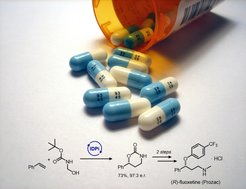Components of important drugs are being made of simple chemicals
Team at the Max Planck Institut für Kohlenforschung develops new synthesis of 1,3-amino alcohols
1,3-amino alcohols are needed for the production of important drugs. Max Planck scientists have now succeeded in finding a new, elegant synthesis pathway for these essential building blocks. The researchers have published their results in the Journal of the American Chemical Society.

Imagine being able to create the building blocks of life-saving drugs from simple, everyday chemicals. That's exactly what a team of the Max Planck Institut für Kohlenforschung has achieved. Marian Guillén, Markus Leutzsch and Benjamin List have developed a new reaction that can efficiently produce "1,3-amino alcohols". These are crucial components in many pharmaceuticals, including popular antidepressants like (R)-fluoxetine. The team has published their findings with the Journal of the American Chemical Society JACS.
Until now, 1,3-amino alcohols have been made from more engineered substrates and with catalysts that contain metals. By using the organocatalytic hetero-Diels–Alder reaction, the scientists combined olefins with in situ generated N-Boc-formaldimine precursors. With the help of powerful acids as catalysts, they were able to create these valuable intermediates towards the amino alcohols in a way that's both scalable and cost-effective.
“This breakthrough means that we can produce important medicines more efficiently and sustainably”, explains Marian Guillén, first author of the paper. According to her and her colleagues, the method is not only innovative but also step-economical and requires only minor purifications.
“In future, we want to try to apply our method on larger amounts”, says Marian Guillén, “this time heading for solid supported catalysts. These would be much easier to recycle.”












